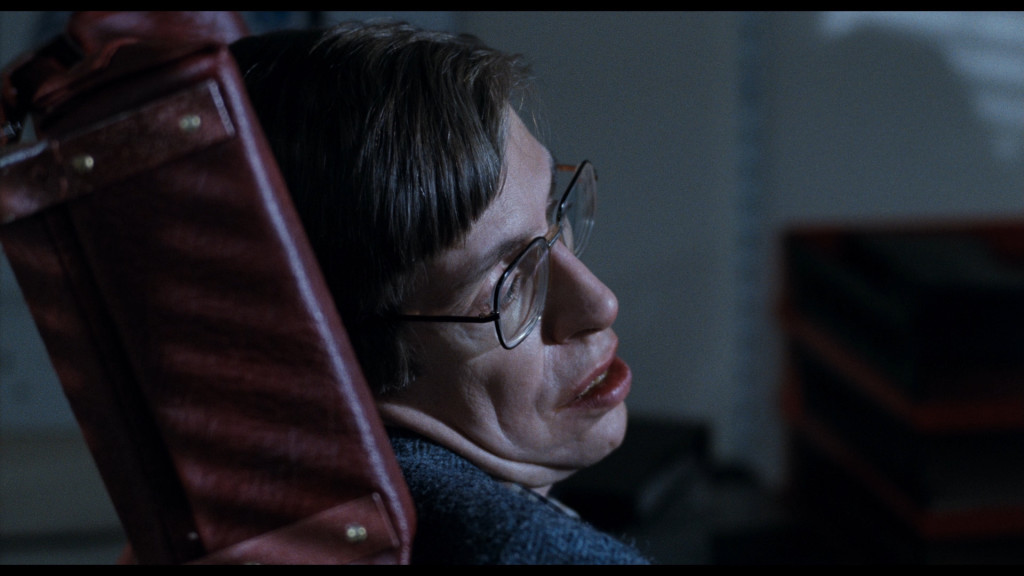Imagine a world where the vastness of the universe, the secrets of time, and the enigma of black holes are not merely abstract concepts, but tangible experiences. Errol Morris, the renowned filmmaker known for his innovative documentaries, embarked on a journey to delve into the mind of Stephen Hawking, the renowned physicist who redefined our understanding of the cosmos through his groundbreaking book, “A Brief History of Time.” But Morris’s project wasn’t a straightforward biographical film; it was an immersive exploration, asking fundamental questions about the nature of time, the power of scientific pursuit, and the human yearning for knowledge.

Image: posteritati.com
The intersection of Morris’s filmmaking style, with its focus on intimate interviews and thought-provoking questions, and Hawking’s complex scientific concepts presented a unique challenge. How could one capture the essence of Hawking’s genius and the intricacies of his theories within the constraints of a film? Morris, a master of storytelling, chose to approach the task with a blend of ingenuity and restraint, weaving together interviews, archival footage, and dramatic re-enactments to create a captivating portrait of both the scientist and his monumental work.
The Genius of Stephen Hawking
A Mind Unbound by Physical Limitations
Stephen Hawking, diagnosed with Amyotrophic Lateral Sclerosis (ALS) at the age of 21, defied the odds and became one of the most influential scientists of the 20th century. While his body was gradually imprisoned by the disease, his mind soared through the universe, exploring its mysteries and challenging established theories. Morris’s film captures Hawking’s resilience and his unwavering determination to delve deeper into the intricate workings of time and space.
“A Brief History of Time” (the film), unlike many science documentaries, doesn’t shy away from the complexity of Hawking’s theories. It plunges directly into the heart of the matter, using animations and graphic visualizations to explain concepts like the Big Bang, black holes, and the expansion of the universe. The visuals bridge the gap between the abstract and the tangible, making these complex ideas more accessible to a wider audience.
A Quest for the Ultimate Truth
Hawking’s pursuit of knowledge was driven by an insatiable thirst to uncover the fundamental truths of the cosmos. Morris portrays this relentless drive with a blend of admiration and awe. Through the lens of the interviews, we see Hawking’s dedication to his research, his passion for unraveling the mysteries of the universe, and his humility in the face of the vastness of it all.
The film delves into Hawking’s revolutionary ideas, including his groundbreaking work on black holes, the origin of the universe, and the nature of time itself. It explores how his theories challenged and ultimately redefined our understanding of the cosmos, opening up new avenues for future scientific exploration.

Image: filmmakermagazine.com
The Human Dimension of Science
Beyond the Equations
While Morris’s film delves deeply into the science behind Hawking’s work, it also highlights the human dimension of the scientist. The interviews with Hawking, conducted during various stages of his illness, reveal his wit, his humor, and his philosophical reflections on life, death, and the universe.
Throughout the film, we witness the impact of Hawking’s illness on his life and work. We see the challenges he faced, the adaptations he made, and the incredible strength of character he displayed in the face of adversity. Rather than focusing solely on the scientific achievements, Morris emphasizes the human spirit that fueled Hawking’s journey.
The Power of Curiosity
“A Brief History of Time” (the film) is ultimately a testament to the power of human curiosity. It showcases the relentless drive to unravel the mysteries of the universe, even in the face of insurmountable odds. It reminds us that the pursuit of knowledge, no matter how challenging, is a fundamental human instinct.
Through Hawking’s story, Morris reminds us that scientific breakthroughs often emerge from the most unlikely places. He demonstrates how individuals, driven by a burning desire to understand the world around them, can make a profound impact on the course of history.
The Enduring Legacy of “A Brief History of Time”
A Legacy of Inspiration
Errol Morris’s “A Brief History of Time” is more than just a film about a brilliant scientist; it is a profound exploration of the human spirit, the power of curiosity, and the pursuit of knowledge. It is a testament to the enduring legacy of Stephen Hawking, whose work and life continue to inspire generations of scientists, thinkers, and dreamers.
The film has not only contributed to a wider understanding of Stephen Hawking’s work but also served as a gateway for many into the fascinating world of cosmology and astrophysics. It sparked a renewed interest in science and inspired countless individuals to explore the universe and its mysteries.
A Brief History Of Time Errol Morris
A Call to Explore
In an era where the frontiers of scientific exploration continue to expand, “A Brief History of Time” remains a powerful reminder of the importance of asking the big questions, of pushing the boundaries of human knowledge, and of appreciating the beauty and complexity of the universe we inhabit. Whether you are an avid science enthusiast or simply curious about the cosmos, Errol Morris’s film offers a captivating and thought-provoking journey into the mind of a scientific giant.
So, delve into the depths of time and space, embark on a journey of discovery, and allow yourself to be inspired by the extraordinary life and achievements of Stephen Hawking, a true icon of scientific exploration.






